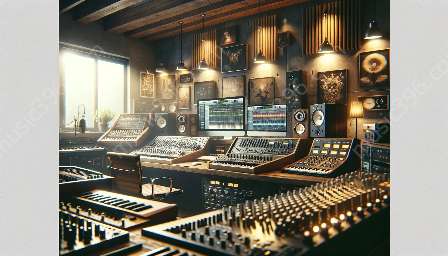Music production is a multi-faceted process that encompasses various stages, from recording to mastering. In this in-depth guide, we will explore the music production workflow, covering the basics of mastering in music and music recording. Whether you're a beginner or an experienced music producer, this comprehensive topic cluster will provide valuable insights and practical tips to help elevate your music production skills.
Understanding Music Production Workflow
Music production workflow refers to the systematic approach and series of steps involved in creating a piece of music. It involves recording, editing, mixing, and mastering, each of which contributes to the overall quality of the final product. By understanding the intricacies of music production workflow, producers can streamline their processes and achieve professional results.
Music Recording: The Foundation of Production
Music recording is the initial stage of the production process, where sound is captured using microphones, instruments, and other audio equipment. It's crucial to set up a conducive recording environment and utilize high-quality recording equipment to capture clean and pristine audio. Understanding microphone placement, signal flow, and the art of capturing performances is essential for creating a solid foundation for the production process.
Basics of Mastering in Music
Mastering is the final stage of music production, where the recorded audio is refined and optimized for distribution and playback. It involves processes such as equalization, compression, and enhancement of the overall audio quality. Mastering also ensures that the final mix sounds polished and cohesive across different playback systems.
Optimizing the Music Production Workflow
Efficient music production workflow involves several key practices, including:
- Organization: Keeping project files, samples, and resources well-organized can greatly enhance productivity and creativity.
- Time Management: Setting realistic timelines and deadlines for different stages of the production process helps maintain focus and efficiency.
- Collaboration: Effective communication and collaboration with artists, engineers, and other stakeholders can enrich the creative process and lead to better results.
- Utilizing Technology: Leveraging digital audio workstations (DAWs), plugins, and software tools can streamline production tasks and expand creative possibilities.
- Continual Learning: Staying updated with industry trends, techniques, and best practices through workshops, online tutorials, and mentorship can enhance production skills.
Enhancing the Production Workflow with Technology
Advancements in technology have revolutionized the music production landscape, offering a myriad of tools and resources to enhance the workflow. From digital audio workstations (DAWs) to virtual instruments and effects plugins, producers have access to a wide range of innovative technologies to streamline their creative process and achieve professional results.
Embracing Creativity and Innovation
While technology plays a pivotal role, it's important for producers to remain creative and innovative in their approach to music production. Experimenting with new sounds, production techniques, and musical styles can lead to groundbreaking and unique creations that resonate with audiences.
Real-world Application of Music Production Workflow
Understanding the nuances of music production workflow is valuable not only for aspiring producers but also for industry professionals. Whether working on a personal project, collaborating with artists, or contributing to commercial productions, having a strong grasp of the production workflow is essential for delivering high-quality music.
This comprehensive topic cluster serves as a resourceful guide for individuals looking to delve deeper into the intricacies of music production workflow, mastering in music, and music recording. By implementing the insights and tips provided, producers can refine their skills and elevate the quality of their music productions.



































